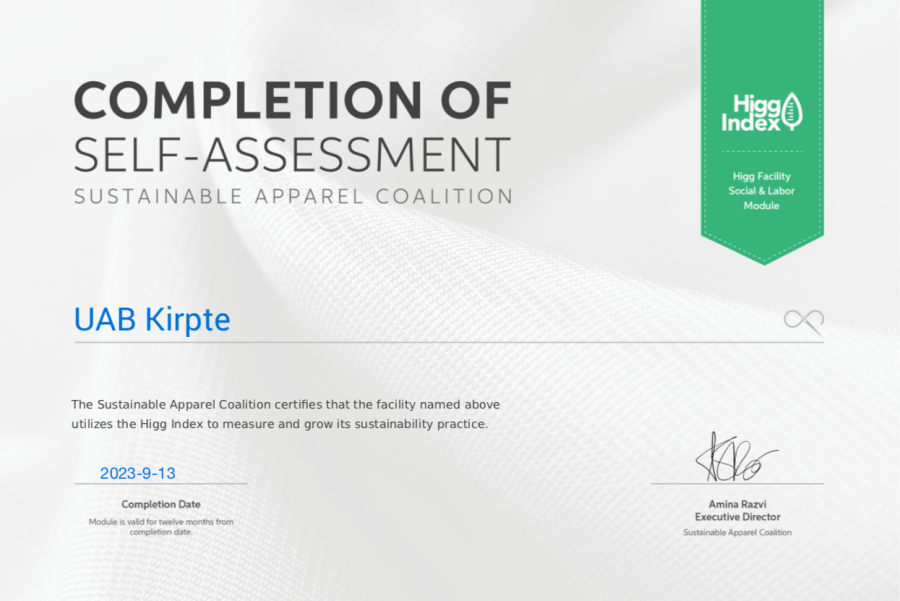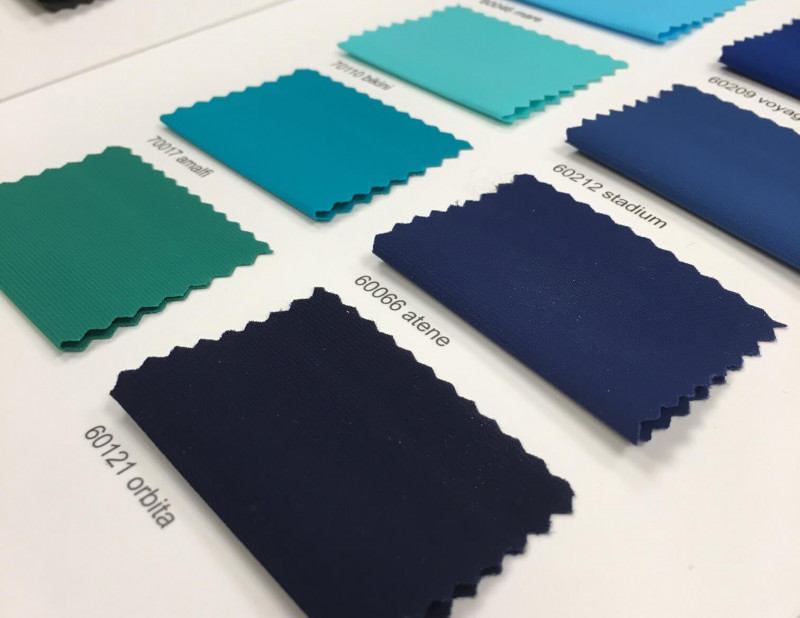
Our Journey with the Higg Index: Elevating Sustainability in Sportswear Manufacturing
In the fast-evolving world of technical sportswear manufacturing, pushing the boundaries of innovation and sustainability is paramount. As a forward-thinking company, UAB Kirpte has embarked on a remarkable journey with the Higg Index: FEM (Facility Environmental Module) and FSLM (Facility Social & Labour Module)-transformative tools that enable the redefinition of manufacturing processes and the setting of new standards for sustainable excellence.
What is Higg Index?
The Higg Index is a set of tools and resources developed by the Sustainable Apparel Coalition (SAC) to measure and assess the environmental and social impacts of products and processes within the apparel, footwear, and textile industry. The goal of the Higg Index is to help companies in this industry make more sustainable and responsible decisions throughout their supply chains. By using the Higg Index, companies can identify areas for improvement, reduce their environmental and social impacts, and make more informed decisions that promote sustainability and responsible business practices within the apparel and textile industry.
What are the two Modules?
The Higg Index includes several modules, each focusing on different aspects of sustainability. As an on-demand sportwear manufacturer, UAB Kirpte primary focus within the Higg Index is on two specific modules: FEM (Facility Environmental Module) and FSLM (Facility Social & Labour Module), which are directly related to company’s sustainability initiatives and responsible manufacturing practices.
FEM (Facility Environmental Module): This module evaluates the environmental sustainability of manufacturing facilities. It covers areas such as energy use, water consumption, greenhouse gas emissions, chemical management, and waste generation. Companies use FEM to assess the environmental performance of their manufacturing sites and identify opportunities for improvement.
FSLM (Facility Social & Labour Module): FSLM assesses social and labour conditions within manufacturing facilities. It includes criteria related to worker safety, fair wages, working hours, and overall worker well-being. This module helps companies ensure that their supply chain adheres to ethical labour practices.
Why is the Higg Index important for on-demand sportswear manufacturer like UAB Kirpte?
The Higg Index FEM (Facility Environmental Module) and FSLM (Facility Social & Labour Module) modules are important for on-demand sportswear manufacturers for several key reasons:
- Environmental Impact Reduction: On-demand manufacturing is a more sustainable approach by minimizing overproduction and reducing excess inventory. FEM module of the Higg Index can help identify opportunities for further environmental impact reduction, such as optimizing energy use, reducing water consumption, and minimizing waste, which align with company’s principles.
- Ethical Labour Practices: Ensuring ethical labour practices is crucial in any manufacturing context, including on-demand sportswear production. The FSLM module focuses on labour conditions, worker safety, and fair wages, which are essential considerations to maintain responsible manufacturing practices.
- Supply Chain Transparency: On-demand manufacturing often involves complex supply chains. The Higg Index promotes supply chain transparency by evaluating and encouraging ethical practices. For on-demand manufacturers, knowing that suppliers adhere to responsible labour and environmental standards is vital to maintaining a transparent and trustworthy supply chain.
- Consumer Trust: Today's consumers are increasingly environmentally and socially conscious. On-demand sportswear manufacturers can build and maintain trust with their customers by demonstrating their commitment to sustainability and responsible labour practices, as assessed by the Higg Index modules.
- Cost Efficiency: Sustainability efforts, as encouraged by the Higg Index, can lead to cost savings in the long run. On-demand manufacturers can benefit from optimizing energy and resource use, reducing waste, and improving overall efficiency, all of which can enhance profitability.
- Competitive Advantage: Embracing sustainability and responsible manufacturing practices can provide a competitive advantage. On-demand sportswear manufacturers can differentiate themselves in the market, attract environmentally conscious consumers, and secure partnerships with retailers and brands that prioritize sustainability.
- Long-Term Viability: Sustainability and responsible manufacturing practices are not just about immediate gains; they are about ensuring long-term business viability. On-demand sportswear manufacturers can use the Higg Index modules to build a foundation for a sustainable and future-proof business.
"Our experience with the Higg Index has been a turning point for UAB Kirpte. It has encouraged us to be even more proactive in advancing technical sportswear manufacturing while always keeping sustainability and social responsibility in mind. Looking ahead, we are committed to setting new standards, fostering innovation, and supporting a greener, more ethical future. Our partnership with the Higg Index continues to guide us towards excellence, and we're excited about the progress we'll make in creating a more sustainable and responsible sportswear industry," shared Vaida Šilalė, Head of HR.


